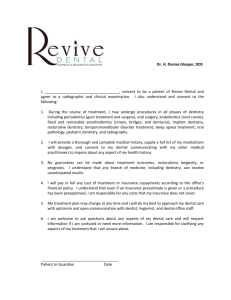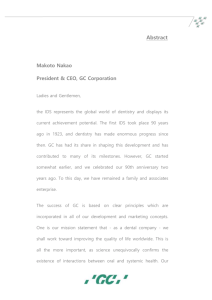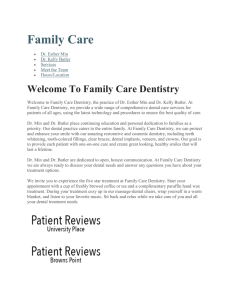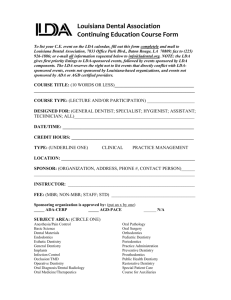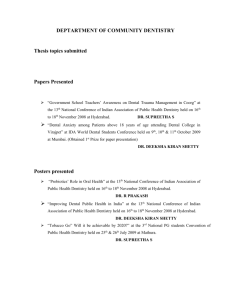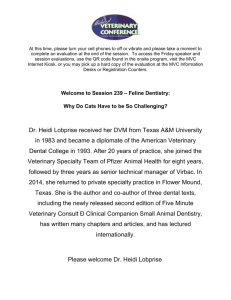Special Care Dentistry - Implementation Plan
advertisement
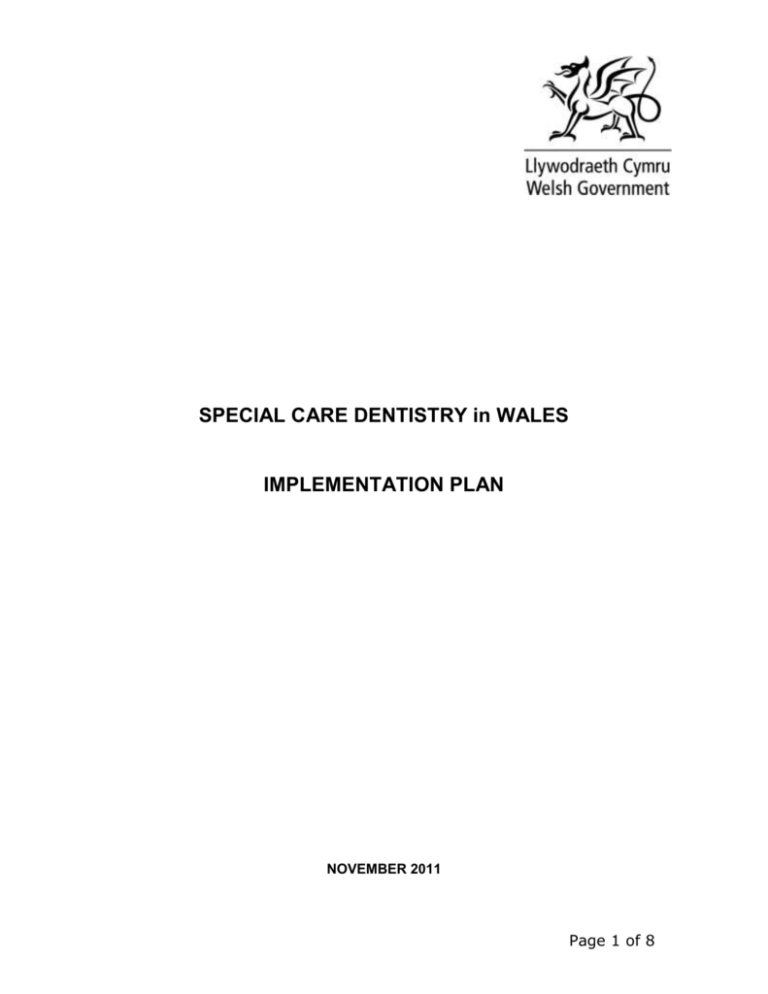
SPECIAL CARE DENTISTRY in WALES IMPLEMENTATION PLAN NOVEMBER 2011 Page 1 of 8 1. Background 1.1 Development of the Speciality of Special Care Dentistry Special Care Dentistry was recognised as a speciality by the General Dental Council in 2008 and the specialist list was established. The speciality is defined as the improvement of oral health of individuals and groups in society with impairment or disability by providing and enabling the delivery of oral care for people with for example physical, sensory, intellectual, mental, medical, emotional or social impairments or disability or, more often, a combination of these factors. 1.2 Welsh context There are many factors that are likely to add to both the need and demand for Special Care Dentistry. These principally relate to changes in the demography of the population, public values and expectations, reconfiguration of health services delivery and dental service developments (British Society for Disability and Oral Health: “Commissioning Tool for Special Care Dentistry 2006”). The implementation process of the review of the speciality in Wales provides an important opportunity to lay down strong foundations for the speciality. This has delivered a strategic all-Wales development plan to address the inequalities in provision of special care dentistry to highly vulnerable groups across Wales. It highlights the need to develop specific training positions and publicises to Local Health Boards (LHBs) the importance of developing robust service frameworks to deliver specialist care. 2. Overview A strategic approach is required to develop effective special care dentistry services for vulnerable adults in Wales and to ensure the current inequalities in access to, and uptake of, services can be addressed and monitored. This would be best achieved by regional joint working through formal clinical networks, advised by representatives of stakeholders, co-ordinated by the Welsh Government (WG). Providers of dental services in primary and secondary care, clinicians, managers, local authorities, public health teams, social care teams, patients themselves and their carers all play an important part in delivering oral health promotion and preventive care and should be represented in the governance of these clinical networks. Referral and care pathways need to be as simple and unambiguous as possible to ensure that the clinical needs of patients are dealt with promptly and effectively. The development of all-Wales referral and acceptance guidelines, which could accommodate local variation, would assist this objective. Page 2 of 8 A common approach to data collection and defined processes to enable the transfer of essential information between organisations should be established to ensure patient needs are met. When special care dentistry is provided across different health services, clear lines of responsibility and accountability are required. This is particularly important for patients referred for dental procedures under general anaesthesia or sedation. Better co-ordination, information and access to patient transport services are needed to allow vulnerable adults to use appropriate special care dental services. This is a particular challenge for people in rural communities. Indicators for special care dentistry and data sets for recording special care dentistry activity need to be agreed. Methods to use technology to improve access to Special Care Dentistry expertise and the effectiveness of care delivery need to be considered. 3. The need for an all Wales approach to the planning and delivery of Special Care Dentistry services There are inequalities in access to and uptake of dental services for vulnerable adults in Wales; these inequalities are greater for older people. Some people who need special care dentistry may not be identified as needing help and others may not receive care because of lack of appropriate accessible services and lack of information about how to access services. In some areas, there are no dedicated special care general anaesthetic lists, and special care patients can face unacceptable waiting times. The same situation exists for sedation services in some areas, where no intravenous and limited inhalation sedation services for special care patients is leading to unacceptable waiting times in the Hospital Dental Services. Consultant expertise and specialist training are presently concentrated in the South East of Wales and the specialty should be developed in this way throughout Wales. The funding for, availability and uptake of additional postgraduate training in special care dentistry by dentists and dental care professionals is not related to population needs. Data relating to special care dentistry are variable, and are insufficient for robust planning and monitoring. Page 3 of 8 4. Service Development for Special Care Dentistry Managed clinical networks (MCNs) should be enabled and developed for special care dentistry. Strategically placed “Networks of Special Care Dentistry Excellence” with leadership from a consultant or specialist in special care dentistry should be set up across Wales. The networks should work across Local Health Board boundaries and provider organisations. Networks of clinicians are in a unique position to lead the development of an integrated service approach to special care dentistry. Workforce capacity and capability needs to be developed in all three areas of dental services delivery (general dental practice, community and hospitals). There is a need to utilise skill mix to optimise effective team working and resources. Shared care between and within dental teams can allow nonspecialists to contribute effectively to the delivery of specialist care. Routine care will normally be delivered in a primary care setting. Dental Care Professionals (DCPs) with additional skills can provide support to dentists in all sectors, enabling better quality care and greater access and efficiency. 5. Workforce Development Formal training programmes and continuing professional development courses should be provided to address population needs. As part of the national workforce review a specific workforce development process should be developed for special care dentistry in Wales to ensure sufficient specialists (including academic specialists), Community dentists and GDPs, Dentists with a Special Interest (DwSIs) and DCPs should be trained to meet patient needs in Wales. The Special Care Dentistry Workforce needs ongoing development and support to meet the changing needs of the populations they serve and to ensure appropriate succession planning. Teams from Networks of Special Care Dentistry Excellence will need to support the planning, ongoing development and delivery of knowledge, training and experience to the dental workforce. Note: there will be teams who have skills perhaps not possessed by consultants/specialists who will need to be involved e.g. GA teams and sedation teams which may not be located in these centres. Many patients with special care needs may have some or all of their dental treatment in general practice and it is estimated that around three quarters of patients with less complex special care needs who do see a dentist, are seen in general dental practice for at least part of their care. Special Care Dentistry courses, training and placements should be planned and implemented to meet the needs of the general dental teams and the communities they serve. Participation should be supported and encouraged. Page 4 of 8 A consultant or specialist with the necessary management skills will be needed for each Network of Special Care Expertise. This will enable specialist training and the development of Dentists with Special Interests to meet oral health needs across Wales. Specialist training and the development of dentists with Special Interests will also need to be planned to replace outgoing staff with special care expertise and to meet patient care needs. 6. Proposed Implementation Action Plan 6.1 Establishment of a Strategic Advisory Group for SCD Group membership would evolve from the current SCD working group. The Group’s remit would be to monitor progress and outcomes and identify operational issues managed and implemented by regional managed clinical networks. This group would report on an annual basis to the Chief Dental Officer for Wales. Specific tasks will include: 6.1.1 Identify core data collection requirements for special care dentistry. The Group in consultation with MCNs will identify a core data set. Clinical IT systems that are capable of collecting and transferring core data should be introduced to all services. All dental services should be required to routinely collect and share data in a transferable format relating to the oral health care needs and treatment of vulnerable adults. Where feasible this data should be capable of being shared with medical, nursing and social care systems. Target Date: April 2013 Responsibility - Strategic Group/MCNs 6.1.2 Develop a national communication plan regarding Special Care Dentistry The Strategic Advisory group in consultation with MCNs will advise and facilitate the development of guidance by Welsh Government. This will include both interim and substantial guidance regarding network and speciality development. It is expected that the process used could mirror that used recently by the WG to implement the findings of a national review into Orthodontics. Target Date: December 2012 6.2 Responsibility - WG/Strategic Group/MCNs Establish Regional Managed Clinical Networks (MCNs) for Special Care Dentistry Proposed networks would cover: North and Mid Wales (Betsi Cadwaladr and Powys) South West Wales (ABMU and Hwyel Dda) South East Wales (Cardiff and Vale, Cwm Taf and Aneurin Bevan) Page 5 of 8 The networks will be developed with common defined membership, remit and accountabilities and clearly defined boundaries. Target Date: June 2012 6.3 Responsibility - All LHBs Establish MCN work programmes 6.3.1 Each MCN will review/develop a pragmatic dental referral and treatment pathway for adults requiring special care dental service in their area. In consultation with relevant stakeholders, identify levels of need and appropriate limits of complexity to be delivered by: DCPs GDS/CDS/DWSIs Specialists and Consultants in Special Care Dentistry Joint multi-professional specialist teams Initially, exact arrangements are likely to vary across Wales, depending on available and accessible facilities and workforce skills. Existing specialist services (e.g. restorative dentistry, oral and maxillofacial surgery (OMFS)) may already provide some elements of special care dentistry in some areas and will need to be embraced in the future development of services, both for workforce training and supervision and on going service delivery. The pathways should be reviewed frequently and as the workforce and facilities are developed and improved, a common approach should be introduced in all MCNs. Target Date: December 2012 Responsibility - LHBs/MCNs 6.3.2 Provision of regional and relevant local information for patients and clinicians. MCNs working with all relevant local stakeholders will publish specific information to allow clinicians to ensure that patients receive care at the most appropriate time and place. In addition information will be made available to patients and carers about facilities, resources and infrastructure to enable and facilitate easy access to services. MCNs will ensure that the information is provided using reliable and appropriate communication methods and media. Target Date: December 2012 6.4 Responsibility - LHBs/MCNs Development of a Workforce Strategy for Special Care Dentistry in Wales 6.4.1 Speciality development. Working with the Welsh Government, Postgraduate Deanery and those responsible for commissioning and delivering multi professional health care education and training The Strategic Advisory Group should ensure that the Page 6 of 8 national dental workforce review (currently being carried out by NLIAH) contains robust information about the speciality, and, the group works to implement any relevant finding. North Wales will naturally look to North West England in relation to links for SCD and education providers, as well as to those in Wales. The implementation group recommends that the Workforce strategy must consider how to establish and fund additional SCD speciality training programmes based in North and South West Wales. The Implementation group supports the retention of existing training posts in South East Wales. Target Date: March 2013 Responsibility - WG/LHBs/Postgraduate deanery 6.4.2 Continuing Training and Education. Training programmes for Dental Nurses leading to the award of Certificates in Special Care Dentistry and in Conscious Sedation should be regularly provided in all areas of Wales. Annual CPD programmes for the dental team should regularly include special care dentistry, care of older patients and domiciliary care in a format that is acceptable and accessible to participants. Training programmes and continuing professional development courses for trainee and practising general nurses (both in hospitals and primary care) in Wales should include a module on oral health care for vulnerable adults.1 There should be a particular focus on those caring for vulnerable and older people in hospitals, care homes and in their own home. Development of distance and blended learning packages for special care dentistry, especially using web based and IT packages should be considered. Target Date: April 2012 1 Responsibility - WG/LHBs/Postgraduate deanery See also the work of the All Wales Oral Health Assessment and Care Group. Page 7 of 8 Annex1: Implementation Working Group membership Mrs Helen Falcon (Chair) Postgraduate Dental Dean, Oxford Deanery.(Lead Dean Special Care Dentistry COPDEND), Dr Shelagh Thompson Reader in Conscious Sedation and Special Care Dentistry, Honorary Consultant in Special Care Dentistry, Cardiff University. Dr Sandra Sandham Specialist in Dental Public Health (Public Health Wales)/Clinical Director, North Wales Community Dental Service (BCULHB). Mrs Ilona Johnson Walport Research Fellow and Honorary Specialist Registrar Cardiff University. Mrs Rhian Bond Head of Primary Care, Abertawe Bro Morgannwg UHB. Mr David Davies Clinical Service Manager, Community Dental Services Abertawe Bro Morgannwg University Local Health Board. Mrs Catherine O’Sullivan Chief Officer, Aneurin Bevan Community Health Council. Dr Sue Greening Consultant in Special Care Dentistry, Clinical Director, Community Dental Service Aneurin Bevan HB. Mr James Owens Consultant in Restorative Dentistry and Oral Rehabilitation .Abertawe Bro Morgannwg UHB Professor Barbara Chadwick Associate Dean for Postgraduate Studies, Professor of Paediatric Dentistry, Cardiff University. Mr Robert Davies General Dental Practitioner and Dental Practice Advisor. Public Health Wales. Mr Neil James (in attendance) Dental Division, Welsh Government. Page 8 of 8
